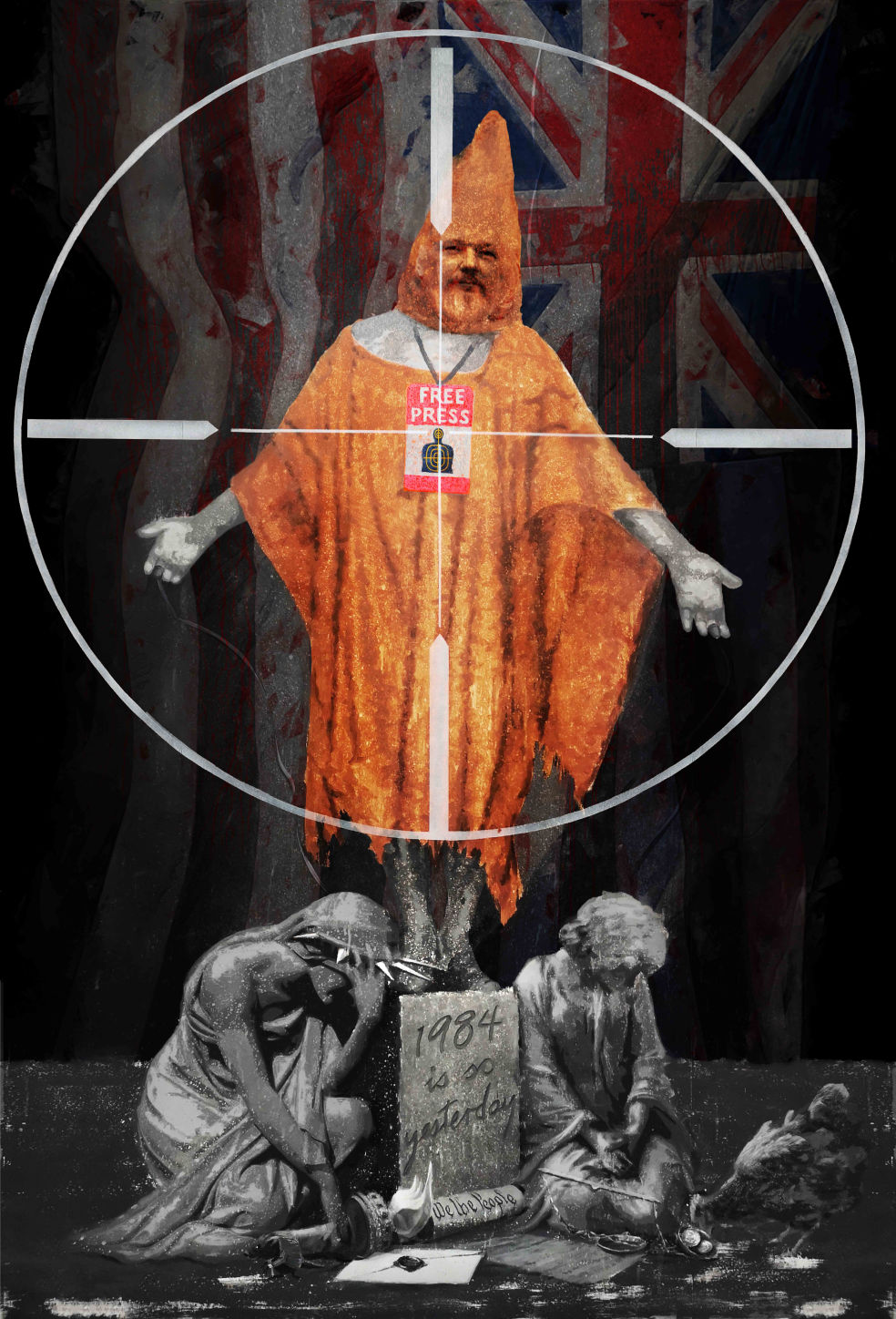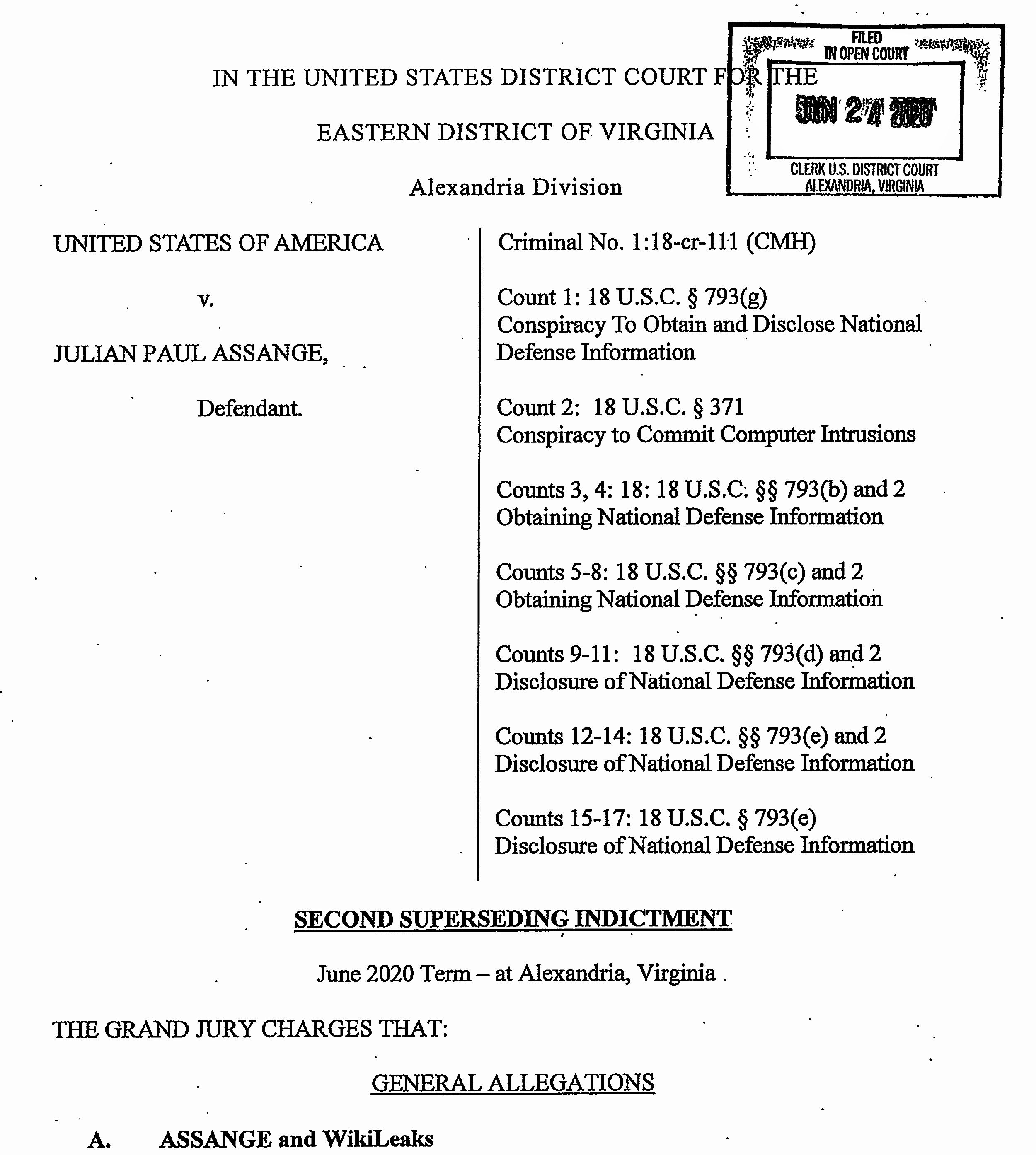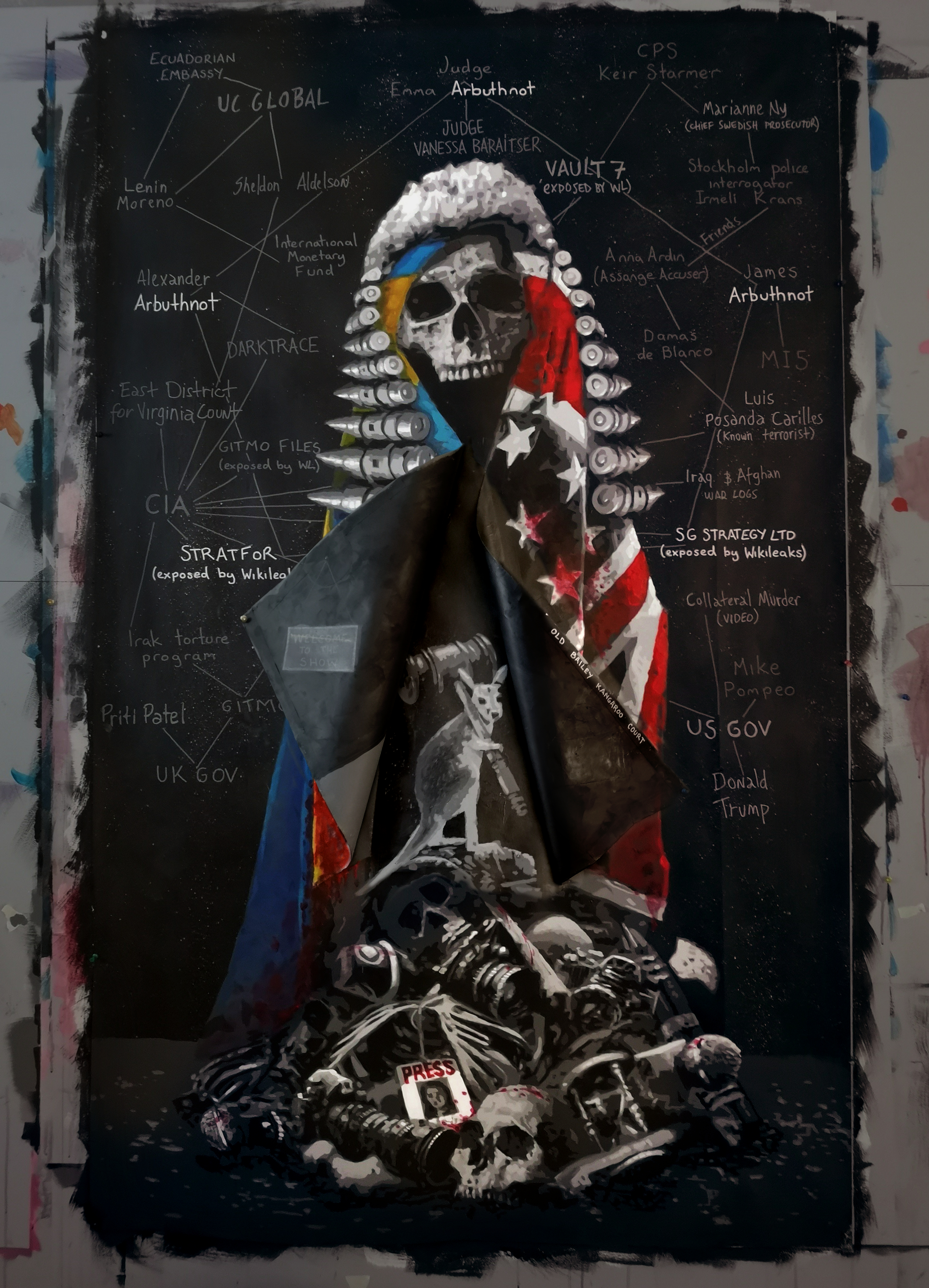The Persecution and Prosecution of Assange and WikiLeaks FREQUENTLY ASKED QUESTIONS (F.A.Q)
The USA want Julian Assange, founder of WikiLeaks, extradited from the UK to the US where he faces a trial in front of a special “espionage court” and a maximum of 175 years in a super-max prison.
Assange extradition hearing ended on Oct. 1st 2020, with a verdict pronounced on Jan. 4th 2021.
Here are a few of the frequently asked questions about the extradition and prosecution of Assange in the US, his extradition hearing in London, and the consequences of this “war on journalism” for everyone, everywhere.
Everyone is invited to edit these answers, add new questions and answers, by editing this page and commenting, and to appropriate this content.
THE POLITICAL PERSECUTION OF ASSANGE AND WIKILEAKS - WAR ON JOURNALISM
What are the implications, should Assange be extradited to the US?
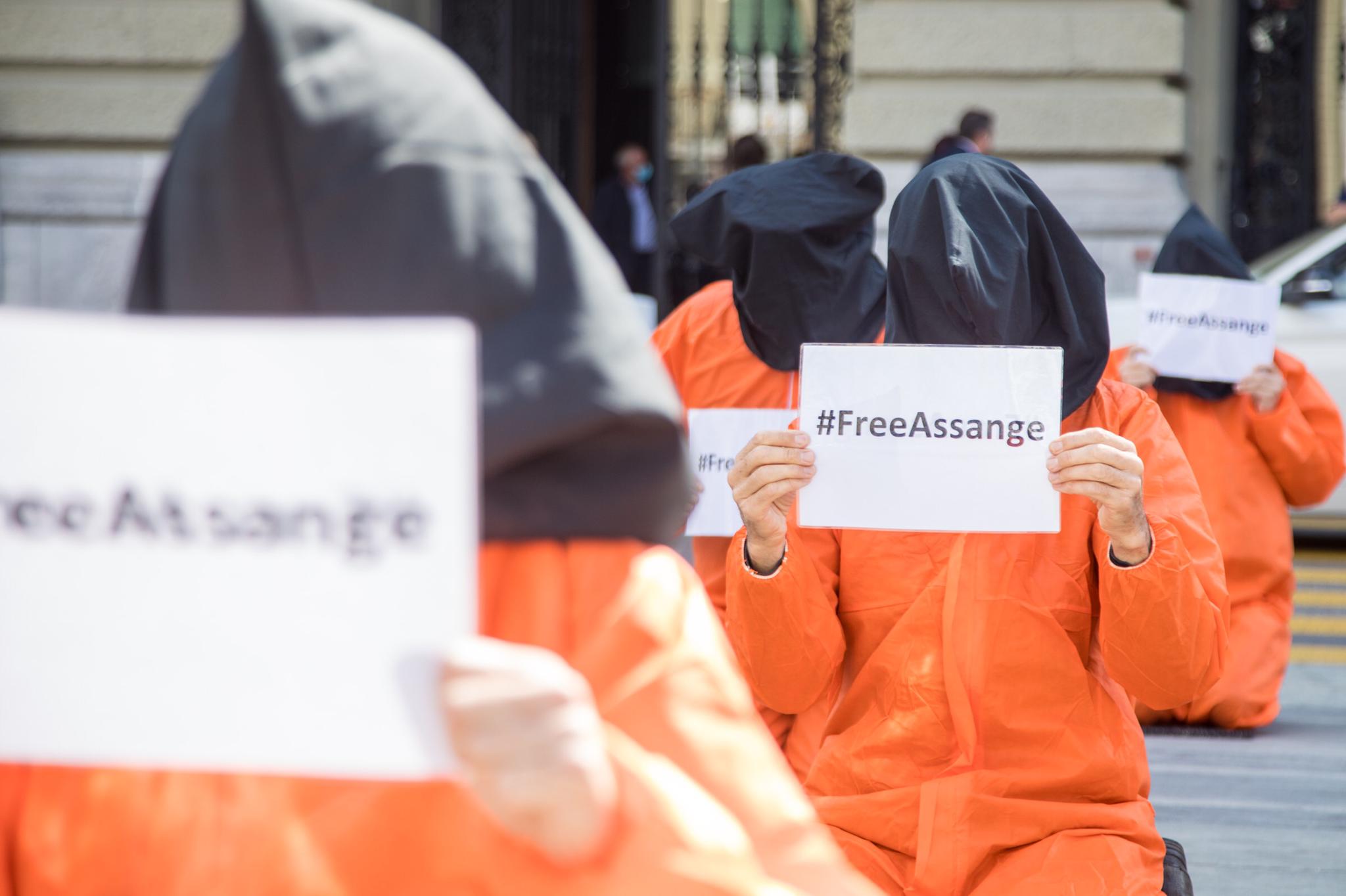 The extradition of Assange to the United States (where he faces up to 175 years in a super-max prison) would create a dangerous precedent. It would validate the use of the US “Espionage Act” of 1917 (a wartime legislation intended to be used to prosecute and execute spies) against any journalist or anyone receiving or publishing national security information, anywhere in the world.
The extradition of Assange to the United States (where he faces up to 175 years in a super-max prison) would create a dangerous precedent. It would validate the use of the US “Espionage Act” of 1917 (a wartime legislation intended to be used to prosecute and execute spies) against any journalist or anyone receiving or publishing national security information, anywhere in the world.
Assange extradition would de facto acknowledge worldwide jurisdiction to the USA: US law applying to anybody, anywhere on the planet, whilst denying constitutional protections, such as the right to free speech under the First Amendment. It would therefore encourage every country in the world to do the same: China could attempt to extradite Canadian journalists. Saudi Arabia could extradite journalists living in Argentina, etc.
Assange's kafkaesque, cruel and drawn out process of extradition, as orchestrated by the US, is fully intended to deter courageous whistleblowers and investigative journalists from further disclosing confidential information in the future.
A successful extradition and prosecution of Assange would mean that their paranoid fantasy of WikiLeaks as “a non-state hostile intelligence service” could then apply to any media organisation, any website or collective investigating and reporting on the US and their wars.
What is Julian Assange actually accused of?
- “conspiracy”; for computer fraud and abuse. This also concerns Chelsea Manning, and others. Under this vague legislation against computer intrusion, Assange is accused of inciting sources to obtain classified material through an alleged conspiracy that would place him as the “mastermind”, directing the actions of groups such as Anonymous, Lulzsec, Antisec.
- “espionage”; for *receiving and detaining* classified material. If this was validated by the court, then every news organisation who ever worked with WikiLeaks, every NGO and individual who would have *seen* the material, possibly even after publication, could potentially be prosecuted under the same charges (even though this material, revealing massive war crimes and corruption, was clearly of immense interest to the public).
Charges against Assange are a “parallel construction”. The FBI and the US Department of Justice (DoJ), most likely with the help of intelligence services, were piecing facts together to back a broad overarching legal theory - namely, statements by FBI informants and notorious felons who were caught by courts impersonating Assange, public speeches held at hacker congresses, jokes between unidentified participants in chat logs, etc. According to the indictment it seems that, back in 2010, all the Internetz were -under instructions from Assange- conspiring against USA's national security…
The charges relate to publications by Wikileaks in 2010 of classified information about the US terror wars in Iraq and Afghanistan and actions dating up to 2013 (such as helping whistleblower Edward Snowden escape to Hong-Kong and save his life!).
 The documents mentioned in the indictment are:
The documents mentioned in the indictment are:
- The “Collateral murder” video describing the brutal murder from an Apache combat helicopter of more than a dozen Iraqi civilians, including two Reuters journalists
- The 391,832 Iraq War Logs revealing more than 15.000 unaccounted civilian death, war crimes and rampant corruption
- The Guantanamo Bay detainee assessments, revealing gruesome lawlessness, arbitrary detention and torture in “Gitmo”
- The 251,287 diplomatic cables of Cablegate, exposing an international effort of bullying, lying to the face of the world and covering and profiteering from corruption by the US.
What will happen to Assange if he is deported to the US?
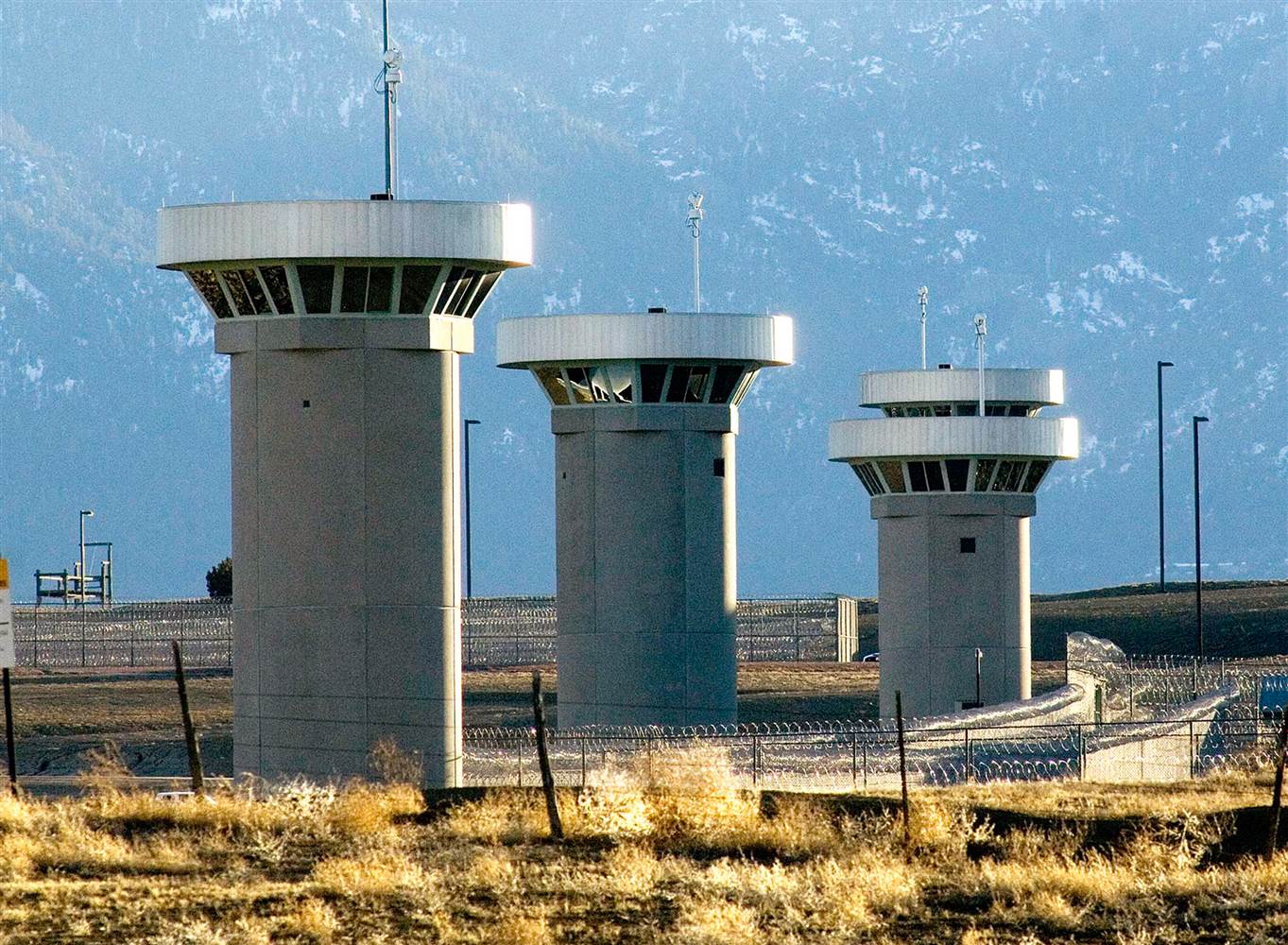 If extradited, Assange faces a maximum of 175 years in prison.
If extradited, Assange faces a maximum of 175 years in prison.
It has been established during the extradition hearing - thanks to affidavits from the US DoJ - that even while awaiting his trial, Assange would be held in the U.S. Penitentiary, Administrative Maximum Security facility in Florence, Colorado, known as ADX Florence and dubbed the “Alcatraz of the Rockies”. It is the US Federal Bureau of Prisons (BOP)'s highest security 'supermax' prison. Assange would likely be held in the prison's H unit (the most secure of them), and most probably under Special Administrative Measures (SAMs) that would further isolate him. In practice he would remain 23h/day in his individual 7' by 12' (2×3.5m) cell, would be prevented from meeting any other inmates, and may (or not) be granted one 15 minute phone call per month.
Read Amnesty International's 2014 report 'ENTOMBED' on the conditions at ADX Florence.
In practice these measures amount to solitary confinement. 22h/day and over of isolation, endured for two weeks and more consist of torture, according to the UN. The UN Special Rapporteur on Torture, Nils Melzer, already confirmed that years of arbitrary detention endured by Assange (first in the Ecuadorian embassy, where it was obvious that he wouldn't be able to leave without being arrested and deported to the US, then in the Belmarsh prison where he is currently held), along with total surveillance and brutal character assassination, amount to psychological torture.
Expert testimonies at the extradition hearing described Assange's physical and mental health as very preoccupying. Coupled with him being diagnosed on the autistic spectrum, it makes it very likely that he could attempt suicide rather than endure this persecution. (A razor blade was found in his cell in Belmarsh, but the prison doctor didn't deem it relevant enough to mention in his medical record…)
Why won't Assange get a fair trial in the USA?
Spying of client-attorney discussion and material
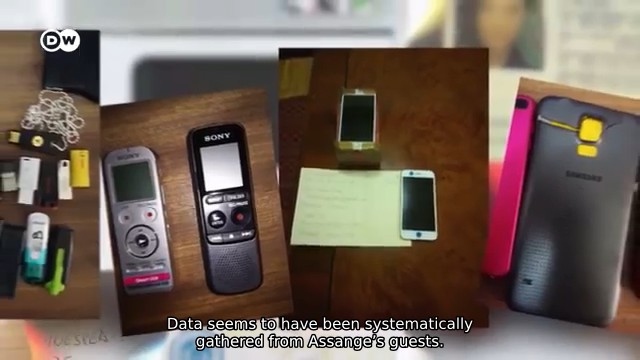 Through the testimony of two former employees of UC Global, the Spanish security company first hired to protect Assange and the Ecudorian Embassy, that later went on to spy on him for the US, the defence demonstrated that Assange's most private conversations with his lawyers were recorded. The confidentiality of a client-attorney relationship is a prerequisite for any trial to be considered fair. In Assange's case it is obvious that the prosecution has a disproportionate advantage over the defence. Furthermore, all of his belongings in the Embassy were seized and sent to the US, including material covered by the client-attorney privilege, along with his private medical records.
Through the testimony of two former employees of UC Global, the Spanish security company first hired to protect Assange and the Ecudorian Embassy, that later went on to spy on him for the US, the defence demonstrated that Assange's most private conversations with his lawyers were recorded. The confidentiality of a client-attorney relationship is a prerequisite for any trial to be considered fair. In Assange's case it is obvious that the prosecution has a disproportionate advantage over the defence. Furthermore, all of his belongings in the Embassy were seized and sent to the US, including material covered by the client-attorney privilege, along with his private medical records.
Political context, death threats
It is also obvious that the US political context, where prominent political figures from both Democratic and Republican parties issued death threats against Assange, called him an “information terrorist”, a “traitor”, "Russian intelligence", etc.. would immensely play against the fairness of his trial there.
After 2016 and the DNC Leaks revealed the rampant corruption and cynicism within the US Democratic Party, Assange lost support from a big portion of the US (center-right) “left” who were not quite ready to recognise just how corrupt Hillary Clinton was…
Prosecution story changes all the time…
It is also worth noting that current accusations are based on a second superseding indictment, telling a completely different story from the previous one! It was published via a press release (and not even sent to the defense, the prosecution or the judge herself!) on June 24th 2020, just one month after the deadline given to the defence to present their evidence and line up their witnesses. The defence was given a few months to prepare against a completely different story, that would have required completely different witnesses, etc.
It is likely that the US prosecution did this, not only to confuse the defence and make their work much harder, but perhaps also because the core of their arguments, concerning the alleged conspiracy between Assange and Manning, didn't seem to hold up very well in court during the first part of the hearing…
Such a blatant violation of the rights of the defense should have sufficed to dismiss the whole case (if it wasn't indeed politically motivated…).
A “secret” trial in front of the “espionage court”
In addition, Assange will be tried in the court of the Eastern District of Virginia. This is significant because it is in this district that most of the U.S. intelligence agencies have their headquarters, as well as the headquarters of their many private contractors. In practice, an estimated 80% of the population of this district would be directly linked to the intelligence sector… Drawing juries “at random” in this district inevitably amounts to appointing individuals with a strong bias to defend the interests of US intelligence. Moreover, this “espionage court”, before which no defendant has ever been acquitted, can - for reasons of national security, obviously - act behind closed doors and on the basis of “secret evidence”.
Did you say “fair”?
Is it true that there were plans to kidnap Assange from the Ecuadorean embassy, or to poison him?
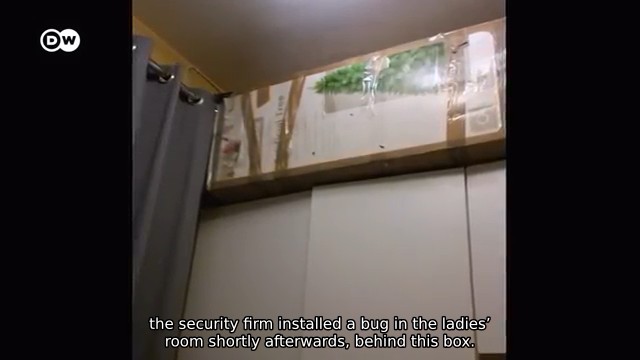 Two anonymous employees from UC Global, the Spanish security company first hired by Ecuador to protect Assange and the embassy, that later went on to spy on him for the US, confirmed during the hearing that their “American friends” discussed plans to get Assange kidnapped or poisoned. They admitted taking orders and transmitting surveillance material through a top executive of Sheldon Adelson (the main funder for Trump's campaign, and his personal friend), and “former” members of the US intelligence agencies with probable ties to the CIA.
Two anonymous employees from UC Global, the Spanish security company first hired by Ecuador to protect Assange and the embassy, that later went on to spy on him for the US, confirmed during the hearing that their “American friends” discussed plans to get Assange kidnapped or poisoned. They admitted taking orders and transmitting surveillance material through a top executive of Sheldon Adelson (the main funder for Trump's campaign, and his personal friend), and “former” members of the US intelligence agencies with probable ties to the CIA.
Surveillance material thus illegally shared with the US includes audio, video and photographic evidence of spying on Assange's colleagues, friends and lawyers, including of them being followed in the street, and in one occurrence having their home broken into.
If Assange is found guilty, will journalists who published WikiLeaks documents be also be prosecuted?
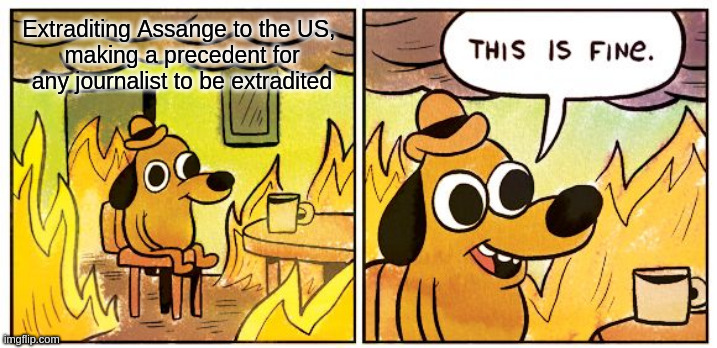 The US government is claiming that Assange is not a journalist and that WikiLeaks' reception, analysis and authentication of documents isn't journalism. This is done in order to break support from journalists and the mainstream press at large. If they don't support him and let him go to the US, they would be complicit in this strategy, which precisely aims at creating a precedent where any of them could be next.
The US government is claiming that Assange is not a journalist and that WikiLeaks' reception, analysis and authentication of documents isn't journalism. This is done in order to break support from journalists and the mainstream press at large. If they don't support him and let him go to the US, they would be complicit in this strategy, which precisely aims at creating a precedent where any of them could be next.
During the extradition hearing, the prosecution representing the US clearly stated that the US Espionage Act *could* be used against any journalist revealing national security information. It just hadn't been used for that purpose… thus far.
It is also worth noting that the US DoJ already expressed their position: as Assange is not a US citizen (then why should he be tried under US law?), he wouldn't benefit from “First Amendment” protection. Any non-US journalist in the world could hence be threatened by the same legal construction: charged under the United States' Espionage Act, but not protected under its First Amendment…
While the prosecution claimed that they wouldn't go after the biggest news outlets (New York Times, Guardian, etc.) who partnered with WikiLeaks in releasing the 2010 logs, video and cables, nothing in their argumentation seems to guarantee that. Nothing was mentioned about not using the same legal persecution against smaller news organisations.
EXTRADITION TO THE US, HEARING IN THE UK
What about the extradition hearing in the UK and the next steps in the procedure?
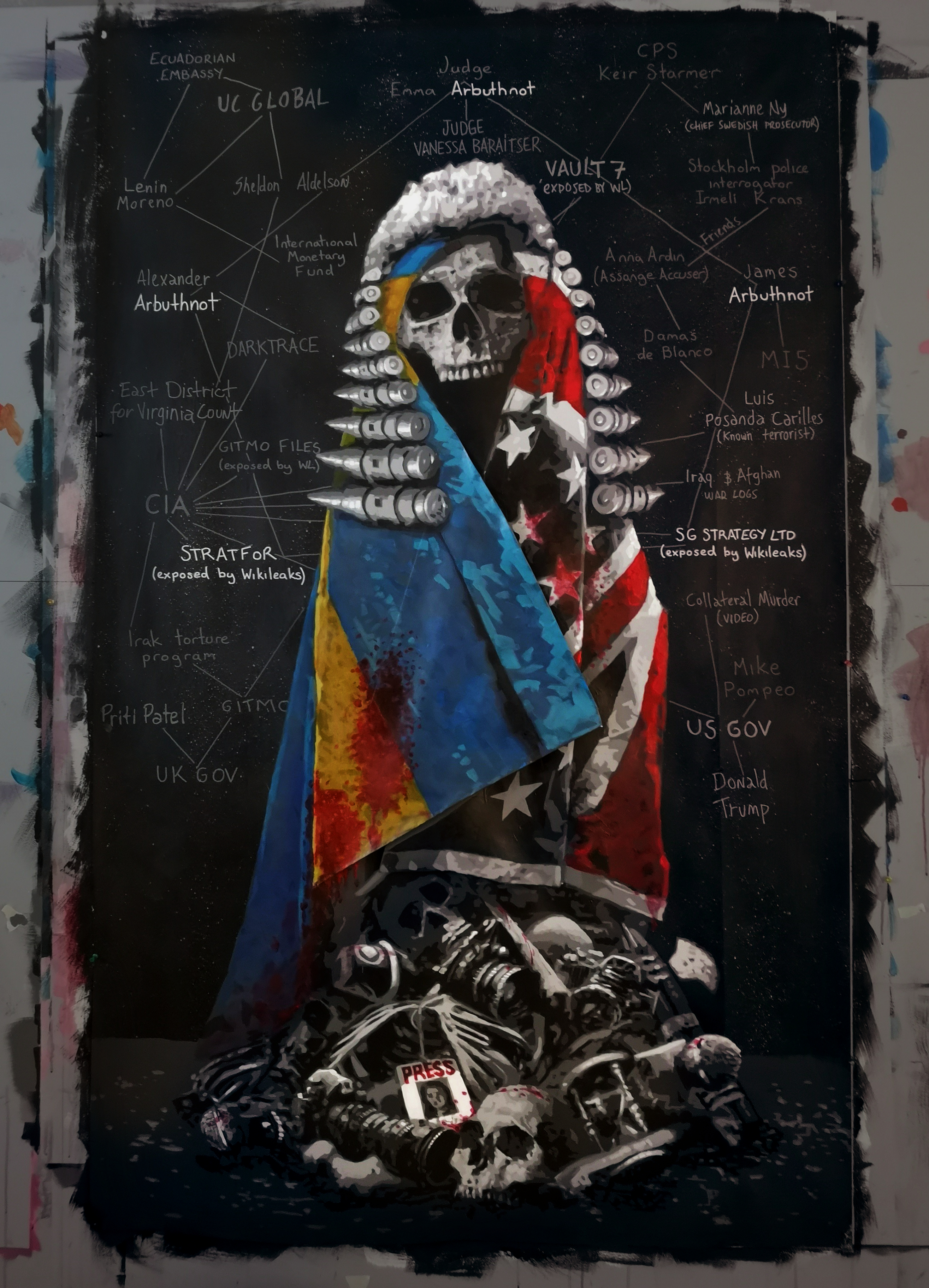 Assange's extradition hearing (which is NOT a *trial* but an administrative procedure, with conditions such as the impossibility for the defendant -Assange- to even speak to defend himself) spanned over 5 weeks:
Assange's extradition hearing (which is NOT a *trial* but an administrative procedure, with conditions such as the impossibility for the defendant -Assange- to even speak to defend himself) spanned over 5 weeks:
- a first session from Feb. 24th to 27th 2020, held at the Woolwich Crown Court, next to the Belmarsh prison in London.
- a 4 weeks session about evidence and witnesses from Sept 7th to Oct 1st 2020, held at the Central Criminal Court, the 'Old Bailey,' in London.
After October 1st, the defence team has one month to write their closing statement, after which time the prosecution has two weeks to send their comments (the defense will then have one more week to comment on legal points raised by the prosecution).
The verdict is expected to be announced on January 4th 2021. ☞ More info on the verdict
Whatever the decision, it is likely that the losing party will appeal to the High Court. It could then move on to the UK Supreme Court, and even to the European Court for Human Rights.
Stay informed on the next steps of the procedure using this regularly updated flowchart
Why is Julian Assange sitting behind bulletproof glass at the hearing?
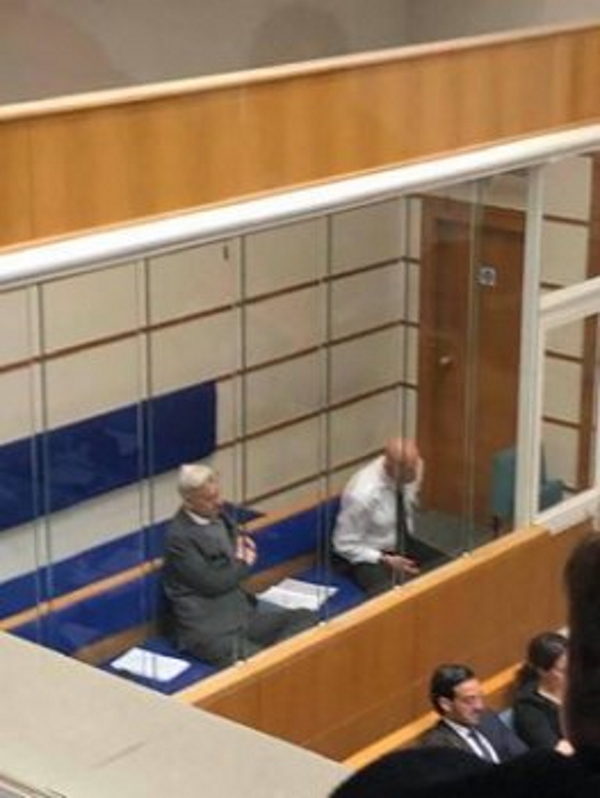 Probably only to further oppress him and make it more difficult for him to defend himself. After not having access to his lawyers for 6 months during the Covid pandemic, being unable to review his legal documents, then only being able to do so on a laptop provided with a non-functioning keyboard (so he cannot even take notes!), he faced an extradition hearing where he wasn't even allowed to speak.
Probably only to further oppress him and make it more difficult for him to defend himself. After not having access to his lawyers for 6 months during the Covid pandemic, being unable to review his legal documents, then only being able to do so on a laptop provided with a non-functioning keyboard (so he cannot even take notes!), he faced an extradition hearing where he wasn't even allowed to speak.
Thus the only communication could have been through his lawyers. Yet, as he was sitting behind a pane of bulletproof glass -like a violent criminal or a terrorist- he had to first successfully manage to catch the attention from his lawyers sitting in the front of the court, then speak to them through the glass, loudly enough for them to hear - making the exchange audible to the entire prosecution team.
Nothing justifies such a treatment for a peaceful, non-violent person accused of… publishing.
Why is he still held in a super-max prison today?
 Good question! A multi-award winning publisher, nominated for the Nobel Peace Prize, sits in a super-max prison nicknamed “the UK Guantanamo” with mass-murderers, terrorist-suspects and other violent criminals, while the authors of the war crimes he denounced keep enjoying their freedom and impunity…
Good question! A multi-award winning publisher, nominated for the Nobel Peace Prize, sits in a super-max prison nicknamed “the UK Guantanamo” with mass-murderers, terrorist-suspects and other violent criminals, while the authors of the war crimes he denounced keep enjoying their freedom and impunity…
When Assange was detained in the “medical” wing of the prison -which many witnesses describe as having worse conditions of isolation than the rest of the prison- the prisoners of Belmarsh themselves petitioned -three times- to the prison direction to end this unfair treatment.
ASSANGE CASE UPDATE - APRIL 2021
What is the current situation of Julian Assange's case? [April 2021]
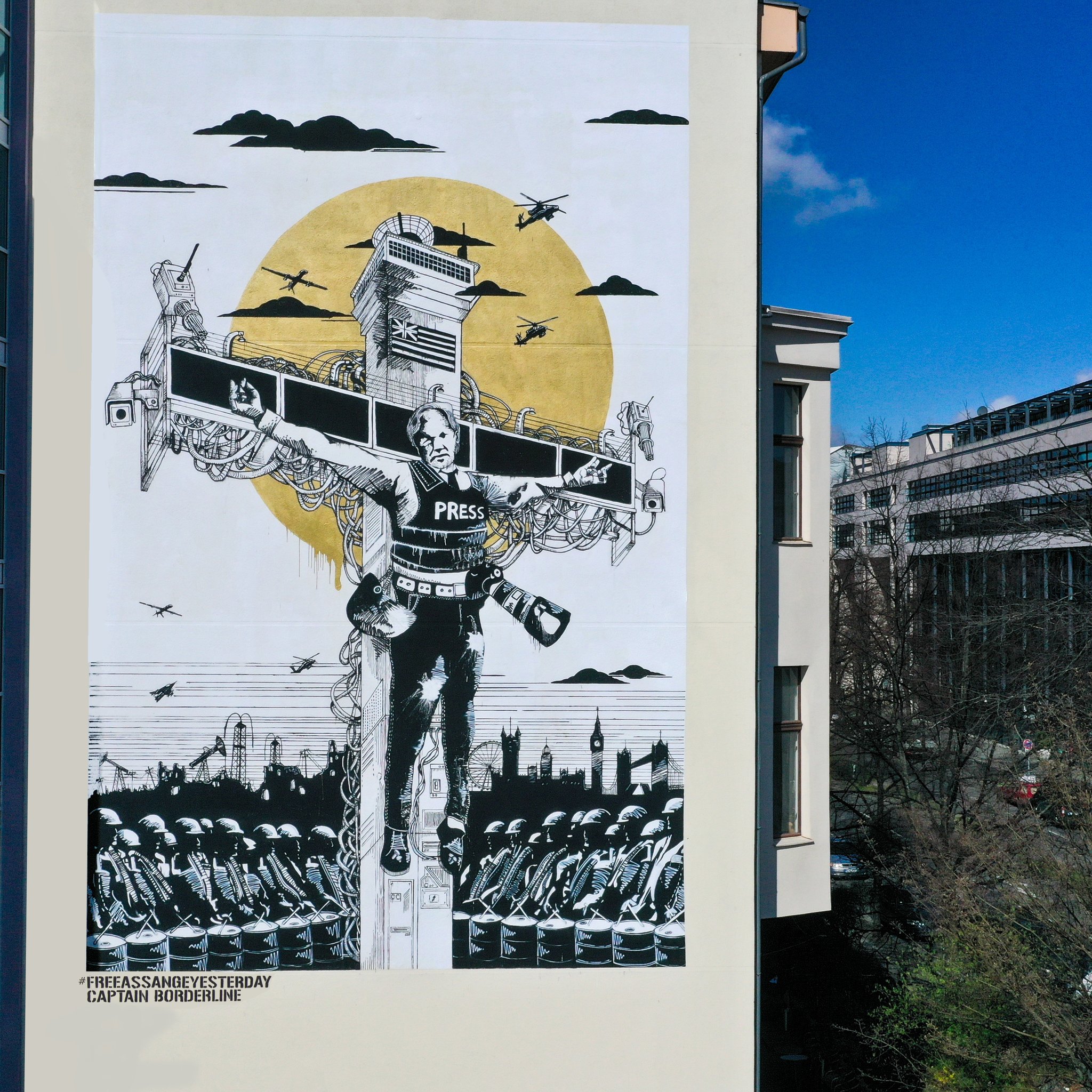 A first instance decision was issued on Jan. 4th 2021 by the Westminster Court of Magistrates, to NOT EXTRADITE Assange to the US. Yet the decision rested solely on the basis of his poor health and the fact that he wouldn't withstand the terrible conditions of the US prison system. (read below for more).
A first instance decision was issued on Jan. 4th 2021 by the Westminster Court of Magistrates, to NOT EXTRADITE Assange to the US. Yet the decision rested solely on the basis of his poor health and the fact that he wouldn't withstand the terrible conditions of the US prison system. (read below for more).
The case is indeed likely to be brought to appeal, perhaps as early as April-May 2021. The main questions being: Will the appeal…
- validate or invalidate the non-extradition verdict based on Assange's health, as well as the state of US prison system?
- validate or invalidate the rest of the decision, concerning press freedom, and the public's right to know. If validated, this decision could create a terrible precedent for press freedom worldwide. Such a verdict would signify that WikiLeaks' work is not journalistic, and hence that anyone in the world publishing major caches of documents revealing crimes, lies and corruption could equally be accused of espionage or such in other jurisdictions.
Meanwhile, Julian Assange remains in Belmarsh high security prison -dubbed the "British Guantanamo" - where he has been unlawfully detained since 11 April 2019, in the midst of the Covid pandemic, and with little-to-no access to visits. His request for bail has been denied.
What is the first instance decision of January 4th 2021 about? What sense can we make of it?
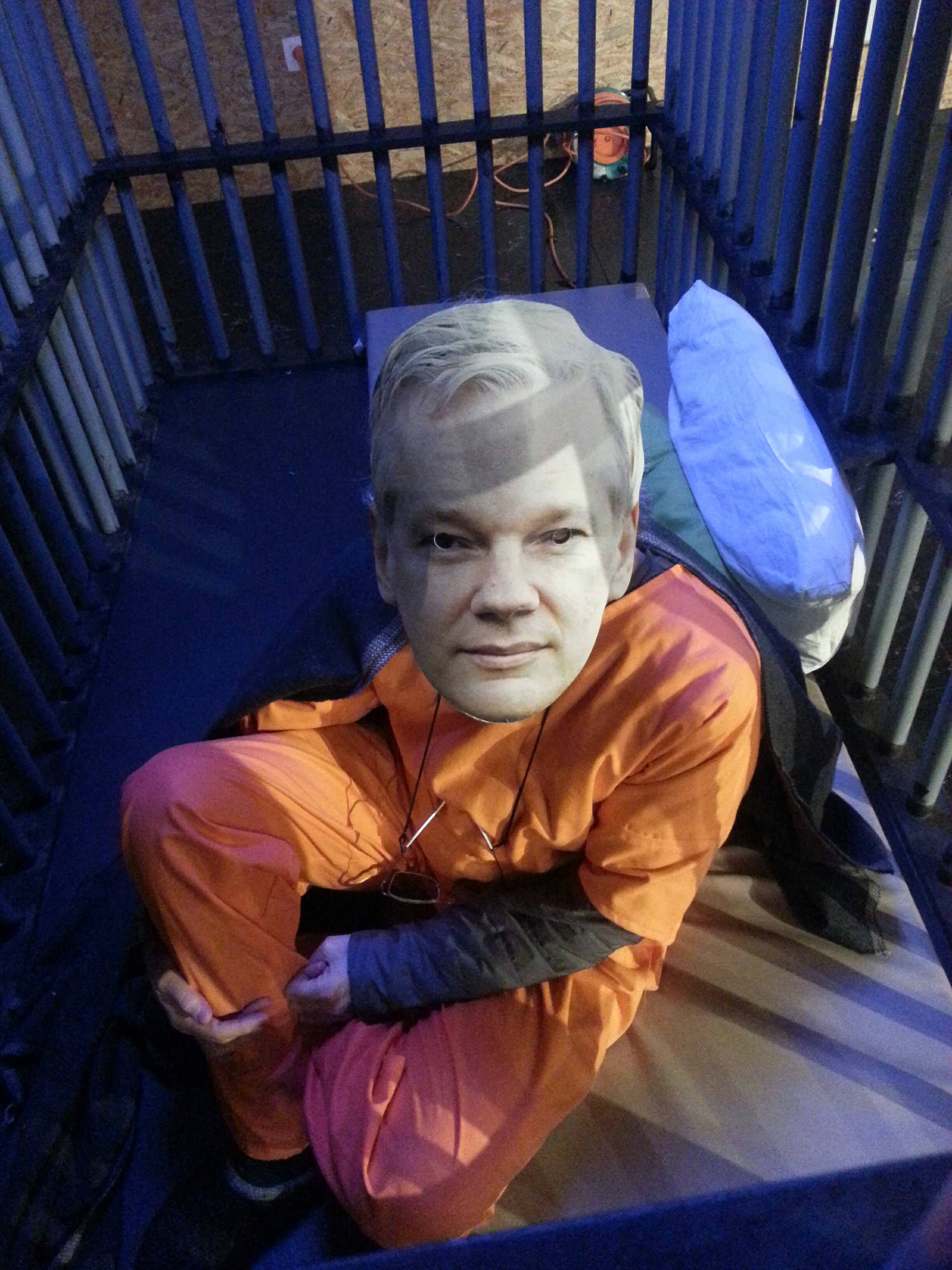 The decision of Jan. 4th 2021 by the Westminster Court of Magistrates can appear surprising and confusing.
The decision of Jan. 4th 2021 by the Westminster Court of Magistrates can appear surprising and confusing.
At first the decision may look like a victory; Assange should not be extradited!
…but when read in details, it appears truly concerning :
- the only reason for him to not be extradited is a combination of his poor health and how terrible the US prison system is;
- the rest of the decision negates the journalistic and political nature of WikiLeaks' work; major releases of documents relating to war crimes are deemed by a court judge as not of general interest, neither are they considered political in nature.
- the rest of the decision also negates the diligent efforts made to redact out of the released materials any sensitive information that could put anybody at risk.
We will not speculate here on whether or not this surprising first instance decision is part of a coordinated strategy, along with the US accusation, to keep him in jail and punish him further (punishment by process) whilst delaying the outrageous decision of extraditing him to the US until 1/ there will be less media interest and public attention on his case 2/ the US government has transitioned to Biden's team.
What are the next steps in the procedure [April 2021]?
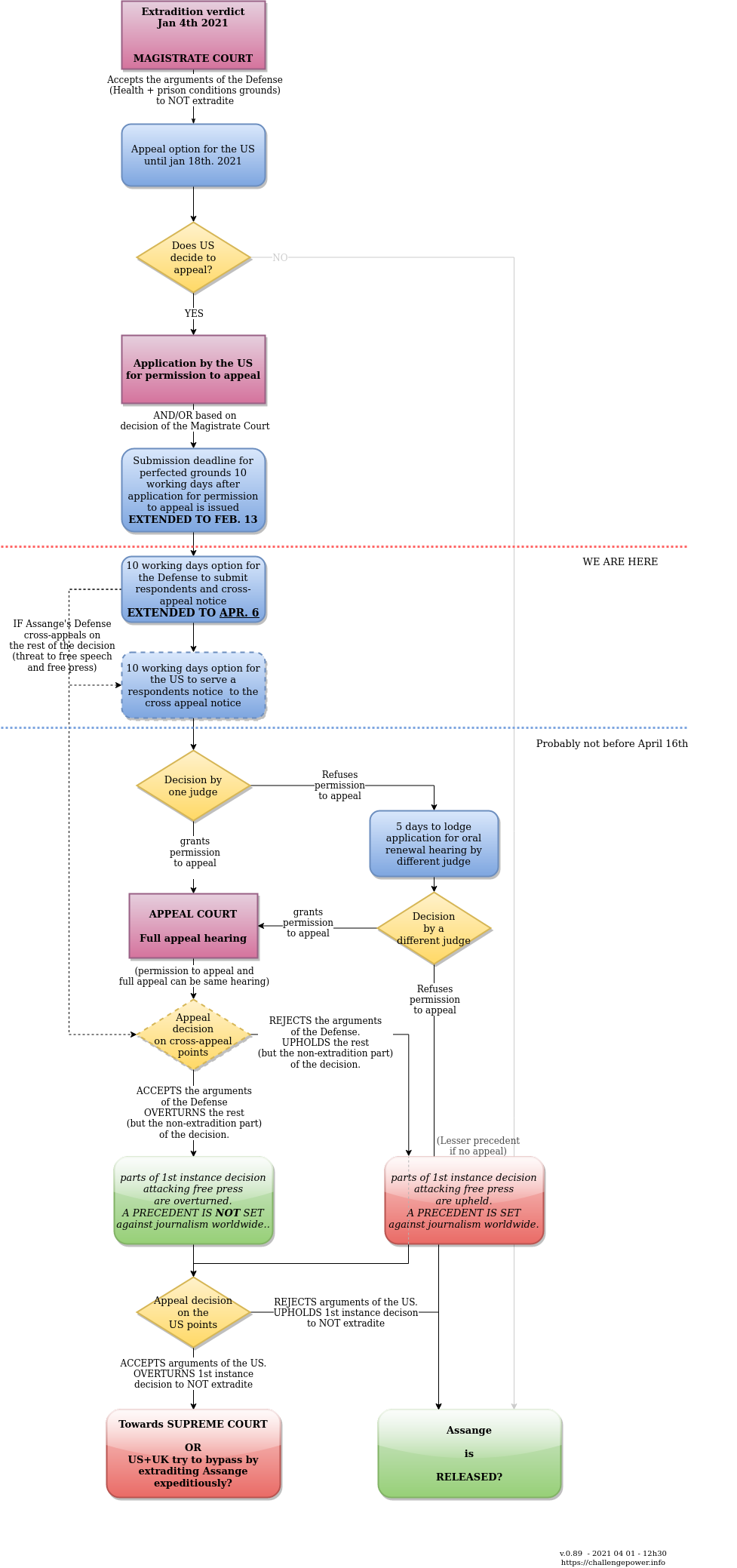 Go to this regularly updated chart to stay informed on the next steps: https://challengepower.info/flowchart_extradition_assange_next_steps_after_january4_2021
Go to this regularly updated chart to stay informed on the next steps: https://challengepower.info/flowchart_extradition_assange_next_steps_after_january4_2021
At the time of writing, it is certain that:
The Prosecution (USA)
- (A) The US will appeal the first instance decision of Jan. 4th;
- (B) The US Accusation submitted their “grounds for appeal”. They will likely question Assange's mental health diagnosis and challenge parts of the decision declaring the US prison system too harsh for him to be sent there);
The Defence (Assange)
- (C) The Defence team filed in their “respondent's notice”, in response to the grounds of the US accusation (B);
- (D) The Defence team should file in their “cross-appeal notice” (deadline postponed to April 6th), most likely requesting that the appeal ALSO concern the rest of the decision, thus attempting to cancel parts of the decision denying the journalistic and political nature of WikiLeaks and Assange's work.
Next steps will be:
- (E) the US accusation submitting their “respondent's notice” to the “cross-appeal notice” (sic) filed in by the defence (D);
- (F) A Court of Appeal judge will decide whether or not to allow this appeal (E);
- (G) Subject to authorisation, the appeal hearing (regarding E) will take place - possibly at the same hearing where the authorisation decision (F) itself will be given.
- (H) The decision;
Depending on the result of the appeal (H), there may or may not be an appeal-of-the-appeal (I…?) before the Supreme Court.
Will Assange's situation change now that Biden is the president of the US?
 Biden's Department of Justice announced that they would continue Trump's prosecution and extradition attempt of Assange.
Biden's Department of Justice announced that they would continue Trump's prosecution and extradition attempt of Assange.
This is in spite of the Obama administration's previous conclusions that [charges against Assange should be dropped as they would create a dangerous precedent for press freedom], and consistent with Biden's 2010 declaration about Assange being a “high-tech terrorist” (sic): .
Will other WikiLeaks associates be charged as well?
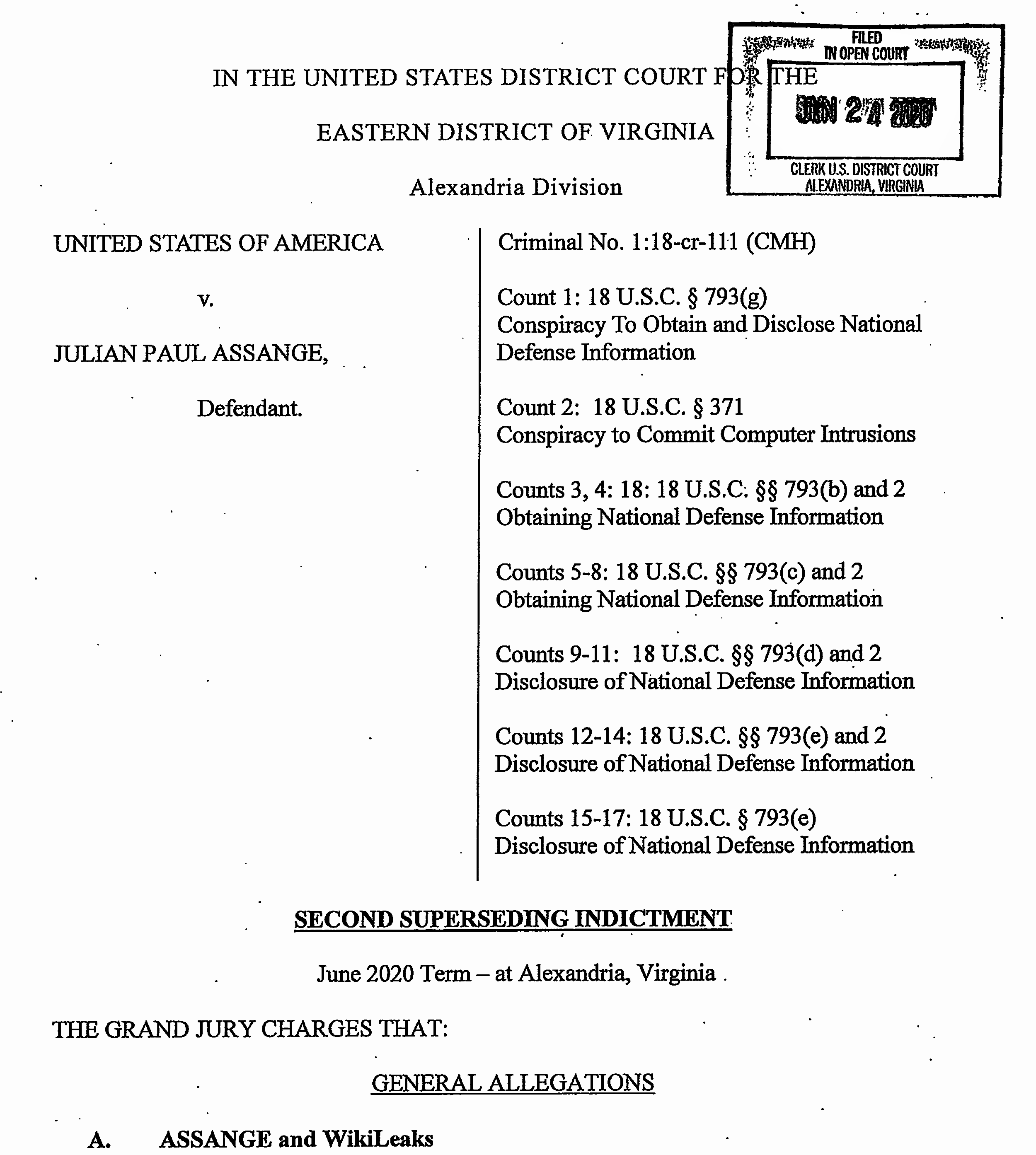 It is very much unclear right now, as this will probably depend on the outcome of the procedure against Assange.
It is very much unclear right now, as this will probably depend on the outcome of the procedure against Assange.
What is clear at this stage is that:
- the US indictment against Assange refers to other people associated with WikiLeaks, so they may also be charged with “espionage” in the US in the future, and we may be faced with attempts of extradition as well;
- the whole indictment (accusation) against Assange rests on the legal construction of a “conspiracy” ; the only “legal” way to have a non-US citizen charged under the US charges of espionage, intended to apply to US citizens only. Consequently other people in contact/working with Assange could potentially be part of a maximalist interpretation of such “conspiracy”. Another evidence, if one is needed, that the whole case is indeed political?
Only when/if the US have it their way, and Assange is extradited, then new indictments could be issued (“unsealed”), potentially targeting more people than just Assange (and more than just the other WikLeaks participants named in the indictment against him) in this “conspiracy for espionage” case, or other separated cases.
If Assange wins the appeal and is not extradited from the UK to the US, and moves to another country, could a new extradition request be made there?
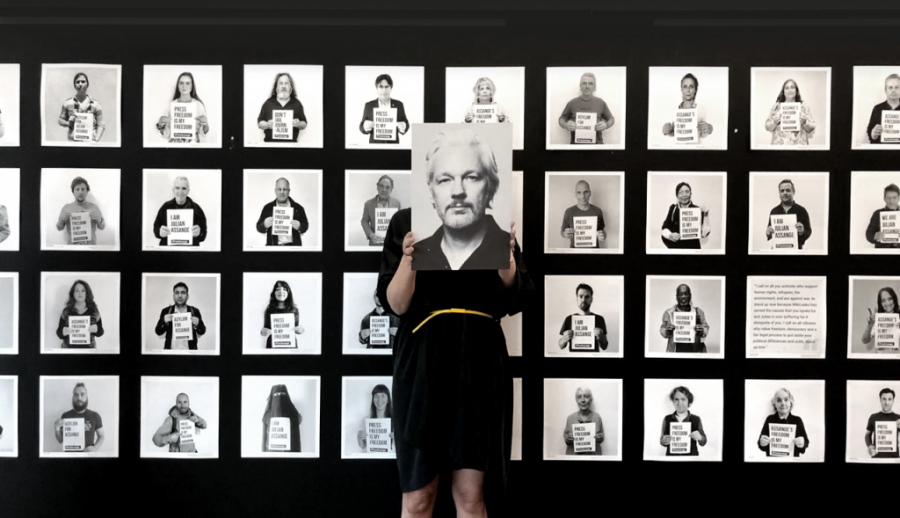 If the UK high court confirms an appeal that he shouldn't be extradited, then Assange should technically be freed from prison in the UK. Would he be able to stay in the UK? Would he be able to travel outside of the UK? It is unclear at this stage.
If the UK high court confirms an appeal that he shouldn't be extradited, then Assange should technically be freed from prison in the UK. Would he be able to stay in the UK? Would he be able to travel outside of the UK? It is unclear at this stage.
If he is able to travel, where could he go? Countries like Sweden have particularly favourable extradition agreements with the US, that make s it easy to extradite someone without even a court decision.
When/if Assange reaches another country, nothing would technically prevent the US from issuing a new extradition request there. This whole “punishment by process” could go on for a long time.
Where is Assange right now? [April 2021]
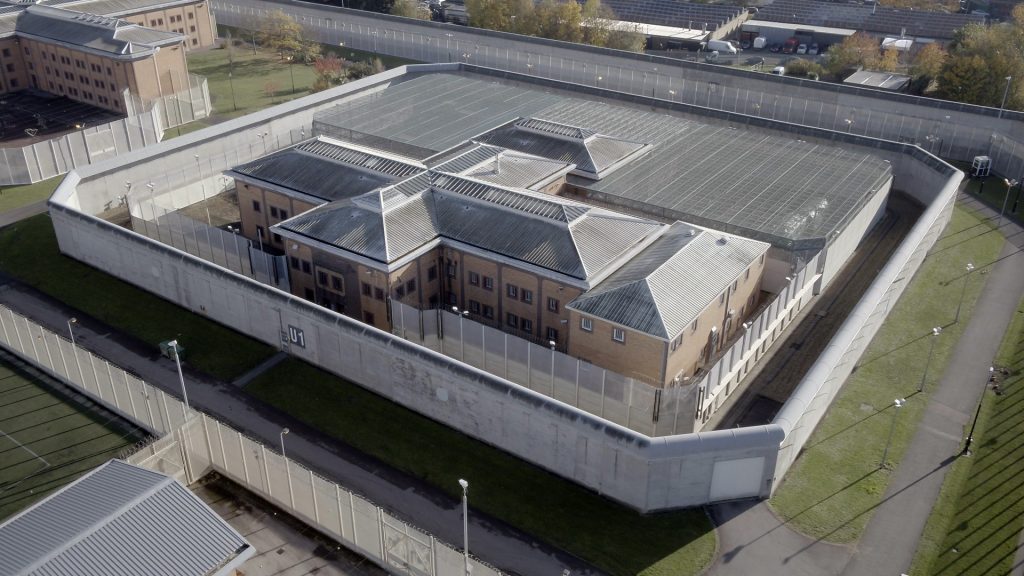 Since being unlawfully dragged out of the Ecuadorian Embassy on April 11th 2019, Assange has been incarcerated in the maximum-secuirty prison of Belmarsh (dubbed "the British Guantanamo"), along with murderers and terrorists, with little-to-no access to visitors.
Since being unlawfully dragged out of the Ecuadorian Embassy on April 11th 2019, Assange has been incarcerated in the maximum-secuirty prison of Belmarsh (dubbed "the British Guantanamo"), along with murderers and terrorists, with little-to-no access to visitors.
He spends more than 23h/day in his cell in conditions that seem punitive and akin to solitary confinement.
FACT-CHECKING ASSANGE AND WIKILEAKS IN COURT
Did the Wikileaks publications cause harm to intelligence sources ?
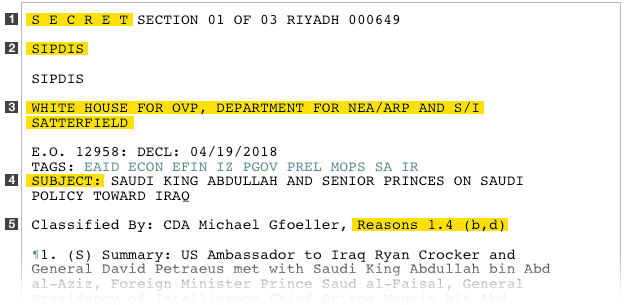 One of the main points of the accusation is that WikiLeaks would have “caused harm” to some alleged sources of US intelligence. This is a ridiculous claim as it has already been demonstrated in the past -including during Chelsea Manning's court martial trial, by Pentagon sources no less- that there has never been any material evidence of such harm being caused, or of any source being hurt or killed directly in consequence of any WikiLeaks publication.
One of the main points of the accusation is that WikiLeaks would have “caused harm” to some alleged sources of US intelligence. This is a ridiculous claim as it has already been demonstrated in the past -including during Chelsea Manning's court martial trial, by Pentagon sources no less- that there has never been any material evidence of such harm being caused, or of any source being hurt or killed directly in consequence of any WikiLeaks publication.
This narrative of “Assange didn't care about protecting sources” was further debunked by numerous witnesses describing how the concerned documents (Iraq and Afghan War logs, Diplomatic Cables) were in reality carefully and thoroughly edited in order to redact sensitive information and names from them, prior to release.
Was Wikileaks first in publishing the fully unredacted Diplomatic Cables?
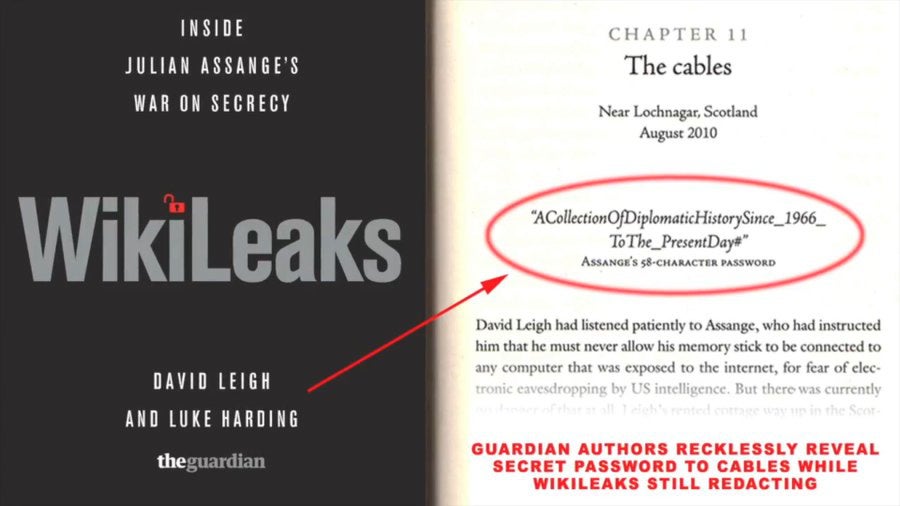 Despite months of care and effort by Wikileaks, in partnership with hundreds of media organsations around the world, to avoid harm by removing the names of potential sources contained in the documents while publishing them, the 251,287 diplomatic cables cache ended up being published, in full, and unredacted.
Despite months of care and effort by Wikileaks, in partnership with hundreds of media organsations around the world, to avoid harm by removing the names of potential sources contained in the documents while publishing them, the 251,287 diplomatic cables cache ended up being published, in full, and unredacted.
Yes the full database ended up being published by WikiLeaks themselves on August 31st 2011, but it was proven in court that this happened only AFTER:
- two journalists from the Guardian, Luke Harding and David Leigh, revealed the actual password to the full unredacted cables in their slanderous book about WikiLeaks published in February 2011, enabling anyone to get one encrypted archive online and access the documents
- Cryptome.org had published that information, a few days ahead of WikiLeaks.
Intriguingly, neither the two Guardian journalists -who further lied about their role in this debacle and about Assange, reporting slanderous stories about him that were further debunked-, nor the US individuals running Cryptome.org ever got accused of espionage. This tends to confirm that the prosecution against Assange and WikiLeaks is purely politically motivated.
Is Assange a journalist? What did he contribute to journalism?
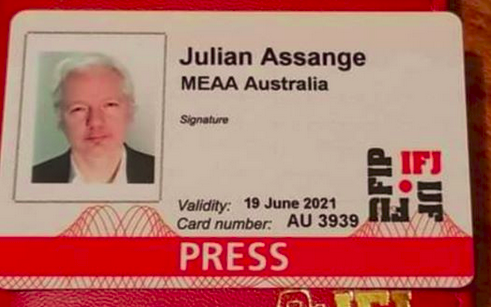 “Is Assange a journalist?” shouldn't even be the question. Nobody deserves such a brutal persecution from the US, the UK, Ecuador and Sweden (while other countries look the other way), whether or not they are journalists.
“Is Assange a journalist?” shouldn't even be the question. Nobody deserves such a brutal persecution from the US, the UK, Ecuador and Sweden (while other countries look the other way), whether or not they are journalists.
Assange has been the bearer of several Australian and International press cards, and has received dozens of prizes and awards for journalism. It has also been widely demonstrated during the hearing that everything that WikiLeaks has done - from gaining access to sources, to protecting them (including through strong and sophisticated counter-measures against state surveillance), to obtaining and analysing documents, to authenticating them and publishing them with some context - is the “bread and butter” of journalism. WikiLeaks' practices are what every good, honest, courageous investigative journalist reporting on wars, crimes, corruption and national security issues should be doing on a daily basis.
As Edward Snowden said:
“So if you go, you know: 'Assange is not a journalist, Assange is not a publisher, WikiLeaks is not journalism…', you really have to ask the question 'then what is?'. No matter what you think about Julian Assange, the methods that Wikileaks and everyone connected to it have pioneered have changed the way journalism is done. And if we cannot recognise that and we are not willing to protect it, i think the saddest part of this whole story is we probably won't deserve it, and as a result we will no longer have it when we need it the most.”
For a detailed analysis of Assange's work in light of the history of journalism, you can read the statement by expert witness Professor Mark Feldstein.
For more information on how Assange's prosecution could affect journalism and the public's right to know, you can read the document “The Assange Precedent” by the Courage Foundation.
Is Assange politically motivated? Is his prosecition politically motivated?
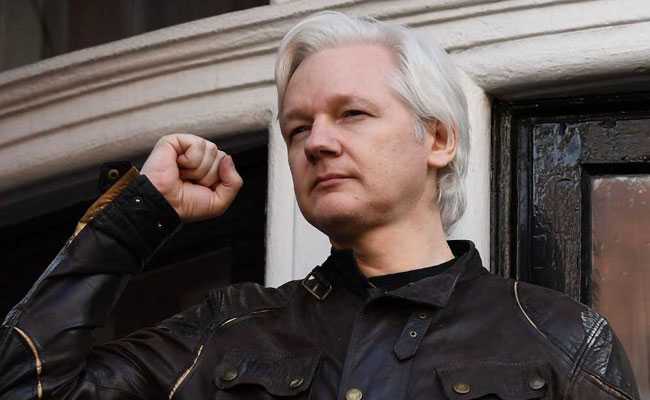 The question whether Assange's actions are politically motivated, and conversely whether the US charges against him politically motivated, is crucial. Indeed there is a political exception to the US-UK Extradition Treaty, forbidding extradition of a prisoner wanted on political grounds.
The question whether Assange's actions are politically motivated, and conversely whether the US charges against him politically motivated, is crucial. Indeed there is a political exception to the US-UK Extradition Treaty, forbidding extradition of a prisoner wanted on political grounds.
For analysis of how Assange is in fact considered by the US government a political opponent that needs to be silenced because of his views and work , you can read statements of expert witnesses Professor Paul Rogers and Professor Noam Chomsky.
